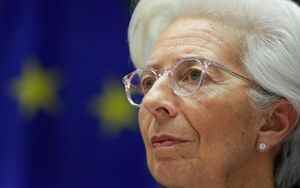(Finance) – The Russia-Ukraine war “not only cast a shadow over Europe, but also raised several questions about where the global economy is heading in the 21st century. The changes we are seeing could mean uncertain times for global trade, said the president of the European Central Bank (ECB). Christine Lagardein a speech in Washington (USA), outlining three changes in world trade in response to this new scenario.
The first step is from dependence to diversification. “Having learned the lessons of the pandemic, companies are unlikely to remain dependent on relatively linear global supply chains,” Lagarde explained. to one greater attention to the diversification of suppliers and the storage of essential inputs “.
However, diversification is likely to have limits and this leads to the second step, which is that from efficiency to safety. “In recent years we have seen a shift towards new industrial policies, led mainly by China and the United States, in which geopolitical biases are introduced into strategic supply chains at the expense of efficiency considerations – said the ECB’s number one -. The US administration has explicitly identified “friendship” as a political goal in its recent supply chain strategy. ” In this sense, the war could also prove to be a turning point for Europe and other regions, making alliances to which supplier countries belong more important.
Lagarde, however, says she is aware that for energy and raw materials Criticisms Increasing security will require a different strategy. “After all, these resources are unevenly distributed around the world and cannot be replaced with domestic alternatives,” he said. “Regions will increasingly have to source their critical inputs from a smaller pool of potential suppliers deemed reliable and in line with their shared strategic interests, and they will have to do so in the context of a green transition that is making some raw materials – such as copper, cobalt and nickel – are increasingly important of others. A new geopolitical race is therefore likely to guarantee access to resources “.
Achieving greater security will not be without cost, which is why the third step is likely to from globalization to regionalization, continue. “The price of greater security could in principle take the form of less international risk sharing and higher transition costs,” she said.
According to Lagarde, “regionalization creates an opportunity for a deeper sharing of regional risk, both through trade and financial integration. This may to some extent replace less risk sharing globally. It facilitates the common financing of strategic priorities and investment in transitions, helping to generate economies of scale. And it can also help offset cost pressures from rising energy prices and associated high transport costs. ”
